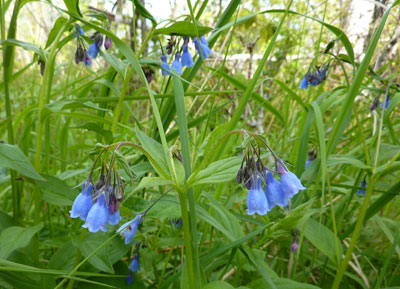 |
| Tall Lungwort, Piedmont Ski Trail, Duluth |
If you NEED some inspiration to get out and explore the foggy North Shore, look no farther than the tall lungwort, a.k.a. northern bluebells.
Tall lungwort (Mertensia paniculata) is found all around the cool, moist shores of Lake Superior...and nowhere else in the eastern United States. The only other place it's found in the US is in the western states, on the cooler, wetter sides of the mountains there.
 |
| Tall Lungwort, Tettegouche State Park |
It seems like every other wildflower on the North Shore is running at least a week late in the blooming calendar. Not this flower; it's right on time.
Imagine those first little green growths of lungwort emerging from the damp North Shore soil, sensing cold and fog and saying, in its little plant voice, "PERFECT! Let's grow."
Inspired? Might as well make the best of this North Shore fog and cold, just like this flower does. Poke your head out the door and into the fog and just say, "PERFECT!"





2 comments:
Hey! North Shore is lovely and unique in many ways and I dearly love it. But Mertensia is not part of its uniqueness. It grows on shady sites throughout Lake and St Louis Counties, all the way to Kabetogama.
Very true, Anonymous, and thanks for pointing that out. I have to believe that Superior has been the center of that population...note how it has spread in the direction of cooler weather. The moisture drops off though west of I Falls, so the Mertensia does too.
There is also a small population in the Door County area of Lake Michigan.
Post a Comment